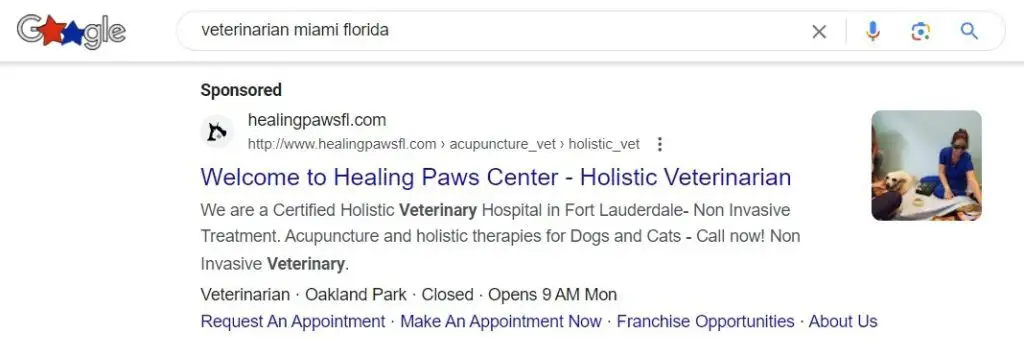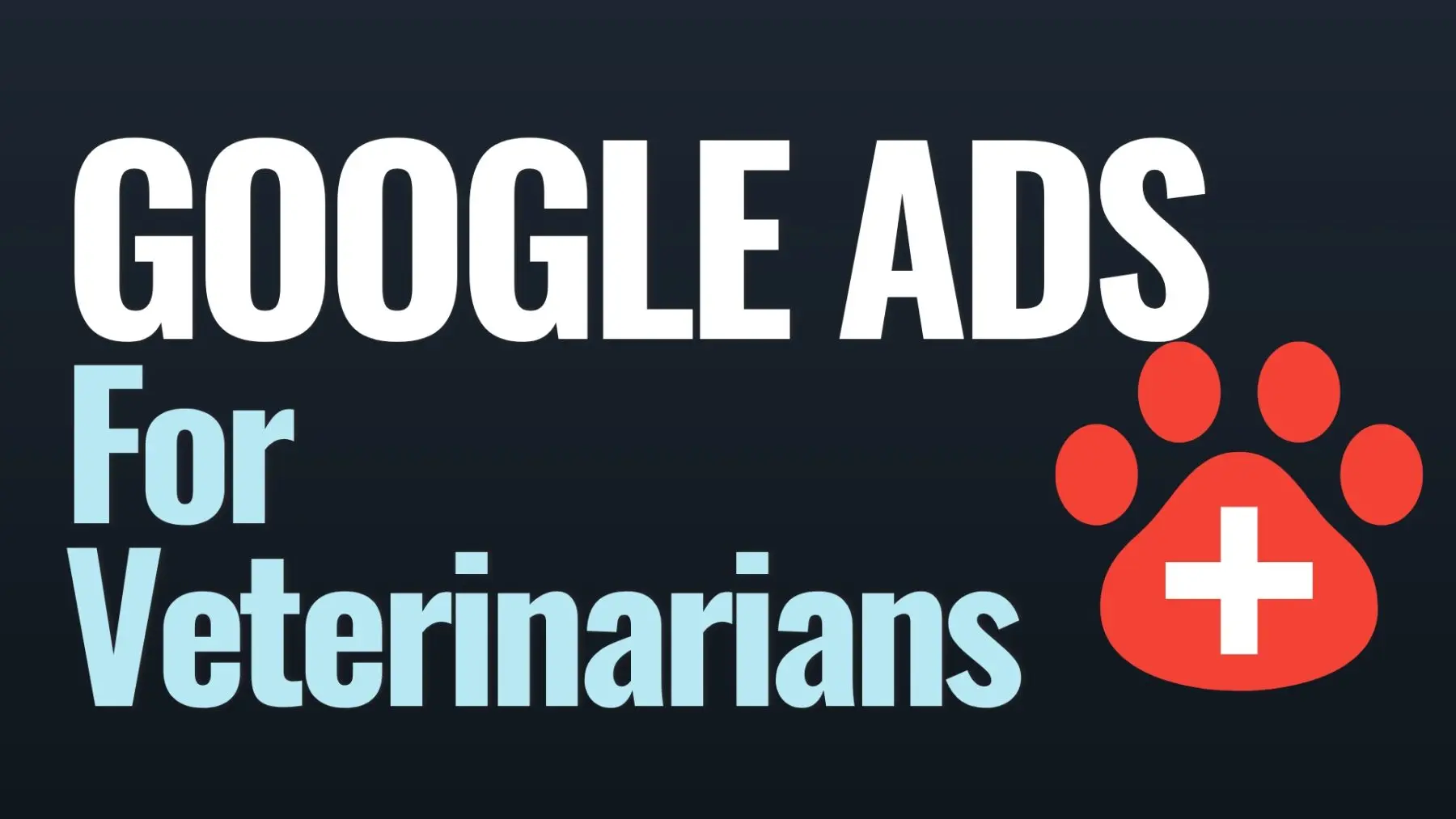Veterinarians have adorable clients, but attracting new ones can be tough. Established practices often rely on word-of-mouth and online reviews, but new offices need to actively bring in clients. Fortunately, Google Ads for Veterinarians can be a powerful tool to use. In this article, We’ll explain how vets can use Google Ads for Veterinarians effectively, covering benefits, challenges, and tips for success.
In this article:
Why Should Veterinarians Test Google Ads?
Google Ads enables businesses to create ads that show up on search engine results pages for relevant keywords. This tool is highly beneficial for veterinary practices, as it helps them enhance their online visibility and connect with potential clients efficiently.
For instance, when searching for a veterinarian in Miami, Florida, I encountered the following ad. Clicking on these ads directs users to the practice’s website, where they can easily schedule appointments or contact the clinic.

Google Ads Strategy for Vets: A Simple 5-Step Guide
The primary campaign recommended for vets is Google Ads search campaigns. These campaigns allow veterinarians to target potential clients precisely when they’re searching for veterinary services. Google Ads for Veterinarians provides immediate visibility and drives relevant clicks and visits to the their clinic’s website.

Vets can advertise specific services like pet vaccinations, dental care, medications, wellness exams, grooming, pet sitting, or emergency treatments through Google Ads. This allows them to target pet owners who are interested in their services effectively.
Track Calls, Contacts, and Appointments
First, create conversion actions for your key performance indicators. Veterinarians typically offer customers the option to call directly, book appointments online, and submit contact forms. Track these actions back to your Google Ads campaigns to optimize for growth in your vet practice.
Select Right Google Ads Keywords
Selecting relevant keywords is pivotal for Google Ads’ success in veterinary marketing. Keywords like “veterinarian,” “pet care,” and “animal hospital” effectively target potential clients actively seeking veterinary services in your area, boosting the visibility of clinic ads in relevant search results.
Additional keywords such as “pet vaccinations,” “dog exams,” “pet medicine,” and even “pet microchipping” can further enhance targeting. With Google Ads, Veterinarians should also target keywords specific to the animals they serve. This ensures ads appear when individuals search for services related to their pets, like cat vaccinations.
Organize Google Ads Search Campaigns Effectively
Crafting compelling ad copy that showcases the clinic’s unique services and value proposition is crucial for a successful Google Ads for Veterinarians Ad campaign. It’s essential to effectively demonstrate the clinic’s expertise and care for animals to attract potential clients.
Organizing ad groups around specific veterinary services enhances targeting effectiveness. Structuring ad groups for services such as pet wellness exams, surgical procedures, or grooming services allows veterinarians to customize ads to meet the specific needs of pet owners.
Send Traffic to Relevant Landing Pages
Creating relevant, high-quality landing pages is essential for driving conversions. A well-designed landing page should provide clear information about veterinary services, encouraging visitors to take action, such as scheduling an appointment.
Optimize Keywords, Ads, Offers, and Landing Pages
Ensure organized ad groups by grouping keywords thematically. Ads must align with keywords and landing pages to ensure relevance throughout the campaign.
5 Best Practices for Google Ads for Veterinarians
Use Exact Match and Phrase Match Keywords
Utilize exact match and phrase match keywords to target only the most relevant searches, enhancing quality score and reducing cost-per-click. Avoid broad-match keywords, which may lead to irrelevant clicks and budget waste. Refine keywords regularly to optimize performance.
Use Search Terms Report to Refine Keywords
Review the search terms report frequently. It shows the actual keywords triggering your ads. You can discover irrelevant terms to add as negatives. This improves campaign relevancy and controls costs over time.
Implement a Clear Call-to-Action
Consistently use a clear, singular call-to-action like “Book Your Appointment” in ad copy and on your site to reinforce the desired action. Consider including promotions such as “New Patients Save $50” to incentivize clicks and conversions.
Track Conversions and Measure Return on Ad Spend
Implement tracking tools like the Google Ads conversion tag to measure campaign-driven conversions accurately. Track various metrics such as phone calls, form fills, site traffic, and new patients. Calculate your monthly return on ad spend to optimize budgets effectively.
Optimize Bidding Strategies for Conversions
Utilize bid strategies such as Target CPA and Maximize Conversions to automatically optimize bids for driving conversions across keywords. This enhances spending efficiency in acquiring new patients. Monitor campaigns closely for optimal performance.
How Vets Can Leverage Other Marketing Strategies Along With Google Ads
Integrating Google Ads with other digital marketing strategies like social media advertising, content marketing, and email campaigns can amplify the impact of veterinary marketing efforts. By crafting a comprehensive marketing strategy, veterinarians can efficiently reach and engage with pet owners.
Search Engine Optimization For Veterinarians
Combining search engine optimization (SEO) efforts with Google Ads can enhance the overall visibility and effectiveness of veterinary marketing. By optimizing the clinic’s website for relevant keywords and creating valuable content, veterinarians can complement their Google Ads strategy and improve their organic search rankings.
Social Media Marketing to Engage Pet Owners
Platforms like Facebook, Instagram, TikTok, and YouTube allow veterinary practices to build their brand identity, engage directly with pet owners, and promote services. Creating social content and running paid ads can help drive online followers and new patients. Offering discounts for social media followers incentivizes new followers. Posting one short video per day across all social media channels can significantly enhance marketing efforts.
Leveraging SMS Marketing for Veterinary Practices
SMS and text message marketing offer a convenient way for veterinary clinics to communicate with clients. Texts can be sent to remind clients of appointments, provide vaccine and wellness check reminders, share links to helpful resources, and deliver special promotions or coupons. This allows vets to keep in touch with clients and encourage return visits.
Implementing a Referral Program for Current Patients
Encouraging happy clients to refer friends and family members can be an excellent way to acquire new patients. Offering referral rewards like discounts on services or products gives pet owners an extra incentive to share the clinic with others, amplifying word-of-mouth marketing.
Local Marketing Initiatives Including Sponsorships, Co-ops, Events, and Partnerships
Getting involved with local pet events, sponsoring community initiatives, partnering with pet businesses, and finding other creative ways to connect with neighborhood pet owners can support a veterinary practice’s local outreach. This on-the-ground marketing complements digital efforts.
Email Marketing for Patient Retention and Acquisition
Collecting client email addresses allows veterinarians to build an email subscriber list. This enables sending appointment reminders, vaccine and wellness check prompts, promotions, newsletters, and other helpful content. Automated email workflows nurture leads and retain existing patients.
Proactively Managing Online Reviews
Monitoring online review sites and encouraging satisfied pet owners to leave positive reviews builds credibility and trust for prospective new clients researching vets online, boosting conversions.
Direct Mail Postcards to Neighborhoods
Veterinarians can use localized direct mail pieces like postcards to promote their services and acquire new pet owner clients. Including special offers and coupons entices new patients, especially in the neighborhoods immediately surrounding the practice.
Conclusion
In conclusion, implementing a comprehensive digital marketing strategy is essential for veterinary practices looking to thrive in today’s competitive landscape. By combining tactics such as Google Ads, SEO, social media marketing, SMS marketing, referral programs, local initiatives, email marketing, online review management, and direct mail, veterinarians can effectively reach and engage with pet owners while driving business growth.
At Adnivate Digital Marketing Agency, we specialize in crafting tailored digital marketing solutions for veterinarians. Whether you need assistance with Google Ads management, social media advertising, email campaigns, or any other aspect of digital marketing, our team is here to help. Contact us today for professional assistance with your veterinary marketing needs.





